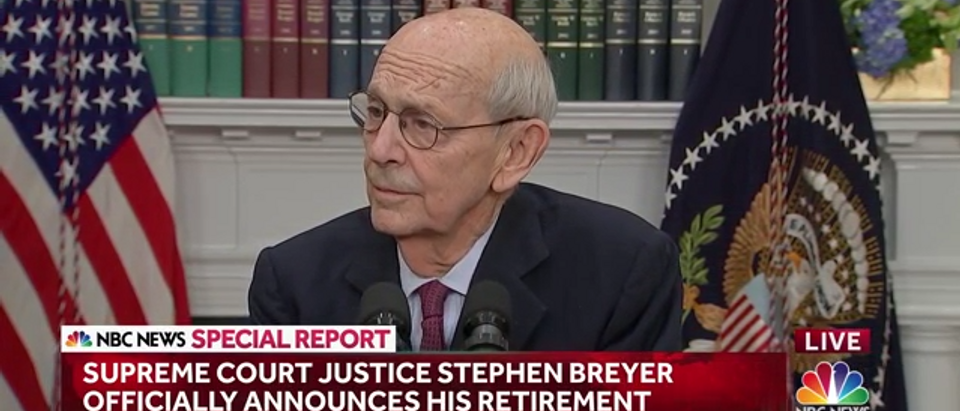Supreme Court Justice Stephen Breyer officially announced his retirement at a White House event Thursday, but President Joe Biden has refused to answer questions regarding who he will nominate to replace the 87-year-old.
Biden reaffirmed his commitment to nominate a black woman for Breyer’s seat during his remarks Thursday but refused to answer questions from reporters following the event, saying it would be “inappropriate” given that Breyer was still an active member of the Supreme Court. Biden praised Breyer in his remarks for his long career, which includes four decades on the federal bench, 28 years of which were spent on the Supreme Court. (RELATED: Biden ‘Has Not Dodged’ Court Packing Question, Just ‘Not Going To Answer,’ Says Campaign Co-Chairman)
“I am not going to take any questions because it is inappropriate to take questions with the justice here. He is still sitting on the bench that you will have plenty of opportunities later today and the rest of the weekend next week too. Thank you very much. Thank you,” Biden said.
WATCH:
Beyer used his outgoing remarks to emphasize that American leaders from George Washington to Abraham Lincoln and through to today believed that America is an ongoing experiment. He said he marveled that a nation of 330 million people, representing every possible viewpoint, have “decided to solve their major differences under the law.”
Biden stated he will announce a decision on Breyer’s replacement by the end of February, but clarified that he has not yet made a decision.
Biden’s eventual nominee faces an uncertain future in an equally divided Senate. While Supreme Court nominees have traditionally enjoyed overwhelming majority votes in the Senate, the votes have become more and more partisan in recent decades.
There is also the question of whether Vice President Kamala Harris would be allowed to cast a deciding vote to approve a nominee in the event of a 50-50 tie. Both Republican and Democrat-leaning legal scholars have indicated in recent years that the vice president’s ability to break ties in the Senate applies only to legislation, not presidential appointments.
“While the vice president has the power to cast a tie-breaking vote to pass a bill, the Constitution does not give him [or her] the power to break ties when it comes to the Senate’s “Advice and Consent” role in approving presidential appointments to the Supreme Court,” wrote Laurence Tribe, a Harvard Law professor and legal ally of Biden’s in a 2020 op-ed. Tribe stated Wednesday that his opinion on the matter has not changed.
Fellow Harvard Law professor Alan Dershowitz, an ally of former President Donald Trump, echoed the sentiment, writing in 2020 that allowing a vice president to break a tie would push both the Supreme Court and the Senate “further down the road of divisiveness and politicization.”
If that standard holds, Biden’s appointee will need at least one Republican vote to reach the Supreme Court bench.


